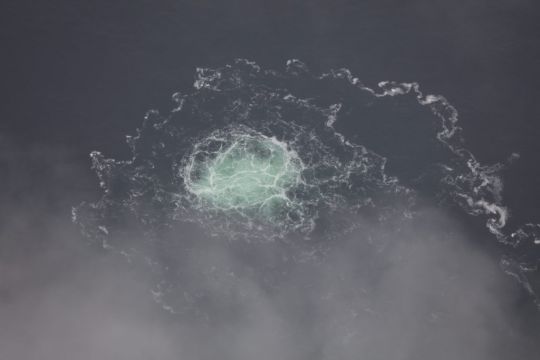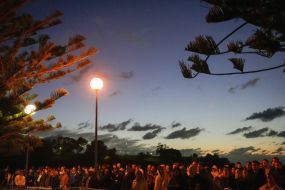Nato has warned it would retaliate over any attacks on the critical infrastructure of its 30 member countries and joined other Western officials in citing sabotage as the likely cause of damage to two natural gas pipelines in the Baltic Sea.
The warning came as the Swedish coast guard confirmed a fourth leak on the pipelines off southern Sweden, which is in the process of joining Nato.
The first leaks in the pipelines that extend from Russia to Germany were reported on Tuesday, prompting energy companies and European governments to beef up security.
Statement by the North Atlantic Council on the damage to the #Nordstream1 and #Nordstream2 gas pipelines ⤵️
— NATO (@NATO) September 29, 2022
Advertisement
The fear of further damage to Europe’s energy infrastructure has added pressure on natural gas prices, which had already been soaring.
Russia, a major supplier to Europe, cut off deliveries earlier this year in retaliation over sanctions imposed after its invasion of Ukraine.
That has caused widespread economic pain across the continent.

Ambassadors at the defence alliance Nato said in a statement that “any deliberate attack against allies’ critical infrastructure would be met with a united and determined response”.
They refrained from saying who they thought was responsible, even though some allies like Poland, and many experts, have said they believe that Russia is responsible.
“All currently available information indicates that this is the result of deliberate, reckless, and irresponsible acts of sabotage. These leaks are causing risks to shipping and substantial environmental damage,” the envoys said.
The rising tensions around energy security in Europe come as Russia prepares to annex four regions of occupied Ukraine, a move widely condemned by the West.

Russian energy giant Gazprom heightened uncertainty around energy supplies on Wednesday by threatening to cease dealing with a Ukrainian company that controls one of the two remaining pipelines that ship Russian gas to Europe.
Rather than assigning blame to anyone specific, EU officials said they would await the outcome of an investigation, which probably will not start in earnest until next week once the undersea pipelines are empty.
The two lines between Russia and Germany were not in operation. But they were filled with tonnes of methane, a major cause of global warming that is being emitted into the atmosphere and will continue to bubble to the Baltic Sea’s surface, probably until Sunday, according to energy experts.
Danish defence minister Morten Bodskov turned to Twitter to call the Nato statement a “joint condemnation and very strong signal from the alliance”.
Any decision by Russia to proceed with the annexation of regions of Ukraine is a dangerous escalation & must not be accepted.
-- @antonioguterres says the UN is fully committed to the sovereignty, unity, independence & territorial integrity of Ukraine. https://t.co/NuZ7uI21JO— United Nations (@UN) September 29, 2022
But Nato has made many statements of resolve to defend its members and their territory since Russia invaded Ukraine in February.
Two of the leaks are on the Nord Stream 1 pipeline that Russia recently turned off as it ramped up energy pressure on Europe. The other two are on Nord Stream 2, which has never been used.
The Danish and Swedish governments have said that they believe the leaks were “deliberate actions”.
According to seismologists, the leaks were preceded by explosions. A first explosion was recorded early on Monday south-east of the Danish island of Bornholm.

A second, stronger blast north-east of the island that night was equivalent to a magnitude-2.3 earthquake. Seismic stations in Denmark, Norway and Finland also registered the explosions.
Speaking on Wednesday before the fourth leak was reported, Swedish Prime Minister Magdalena Andersson said it would have taken a large explosive device to cause the damage.
Swedish officials are testing an undersea power cable that runs between southern Sweden and Poland to see if it was damaged in the incident.
The 250-kilometre high-voltage electricity cable, which lies 500 metres away from the gas pipelines, is not currently in service.
In Moscow, Kremlin spokesman Dmitry Peskov said on Thursday that the Nord Stream pipeline incident would have been impossible without a state actor’s involvement.
“It looks like a terror attack, probably conducted on a state level,” Mr Peskov said in a conference call with reporters.
He dismissed media reports about Russian warships spotted in the area as “stupid and biased”, adding that “many more aircraft and vessels belonging to Nato countries have been spotted in the area”.
The UN Security Council has scheduled an emergency meeting on Friday afternoon at Russia’s request to discuss the suspected pipeline sabotage.







